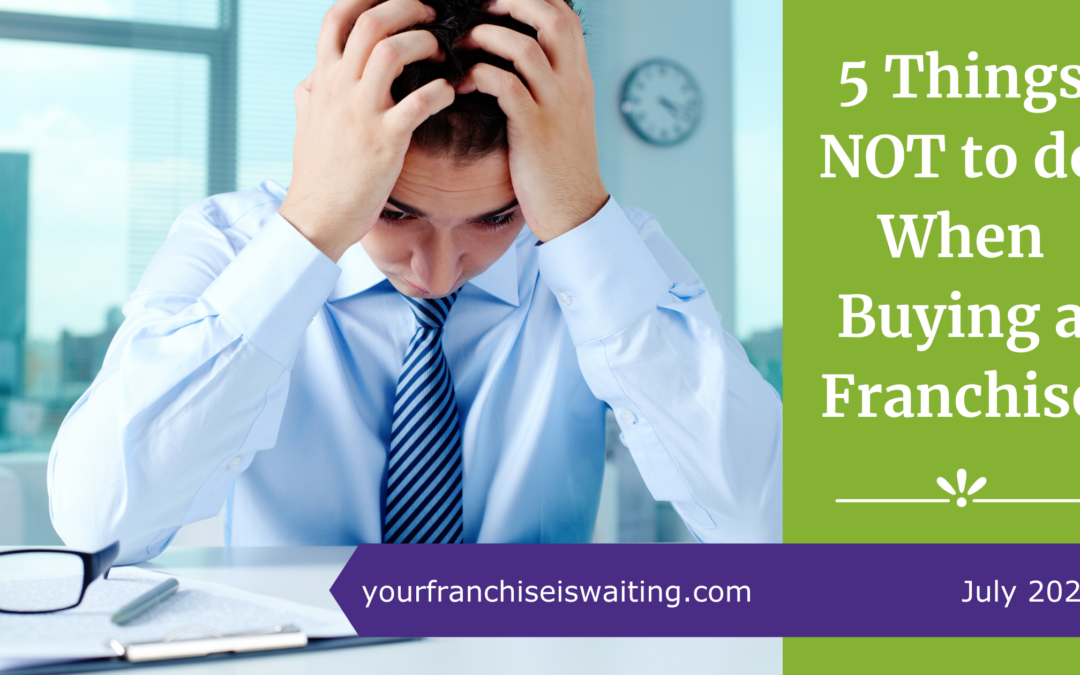When considering buying a franchise, you simply cannot shortcut doing the research properly – and aligning the right business to your skills, investment capital, and lifestyle objectives. Franchise ownership can be a great choice for many – but it’s not a guarantee of success.
In order to set yourself up for a positive outcome, Here are 5 short tips on “What NOT to Do” :
-
Fall in love with a business that you’ve been to – and decide to buy one.
Don’t suffer from “love at first sight” by falling in love with a business that you’ve visited! You need to know the difference between a great business model and the RIGHT business model for you – based on your lifestyle objectives, background, transferable skills and a host of other factors.
Speaking to a professional consultant/broker who can guide you towards concepts based on your strengths and goals (not to mention being in your investment range) is a more logical approach. Start with an honest discussion of how much time you are willing to put in to the business, and what you see yourself doing on a daily basis. Often that’s where the disconnect is.
-
Making a hasty decision without enough validation
Franchisee validation is one of the key ways to evaluate franchise options once you’ve gotten through all of the initial information provided by the development team. During validation, you contact current franchise owners (the franchisees) and/or if possible, meet with some of them in person, to ask as many questions as possible. You will want to ask questions that will provide clarity as to what you should expect as a franchisee. These questions will get you to a better understanding of the positive side of the business, but don’t forget to ask about the negative parts of the business too. And these owners will typically “tell it like it is” in a way that the development team will not.
-
When the perfect opportunity is staring you in the face – stall and do nothing
Fear can make the perfect opportunity slip away if you don’t act on it. Ask yourself, if I do nothing – will my situation improve a year from now? There’s never a perfect time to start a business, but maybe this is the time for you to take a leap of faith and go for it. We’ve seen countless candidates put their search on hold, only to come back later and the territory is no longer available for their first choice. Or come back a few years later and wish they had moved forward when we first spoke.
-
Cut corners, and save some money by not engaging professional help
We always recommend that you hire a CPA/Accountant (preferably with a lot of franchise experience and clients) who can help you evaluate income projections and work with you to develop the numbers side of your business plan. It’s also necessary to have a good franchise attorney who will interpret the agreement you’re about to sign, and point out any red flags. Your neighbor, the personal injury attorney, is not going to be of help here.
-
Fail to have appropriate capitalization
While this common mistake is listed last, it’s by far the biggest predictor of failure. It can stem from not properly researching concepts (as in not speaking to enough franchisees or asking the hard questions) or from not spending the time and focus needed on your business plan to determine the true start-up costs you’ll need to open your business. Remember you will need enough of a financial runway to get through until you cash flow (which can be up to a year or even longer, depending on the type of business) but also to pay your personal living expenses AND the capital to cover the debt service as well.
Being under capitalized could also result in you not adequately marketing your business, resulting in a tepid launch – then down the road, you could run through your working capital before the business has had a chance to ramp up or cash flow.
This topic of the month was originally featured as a blog post July 10, 2016. Read the blog post here.

